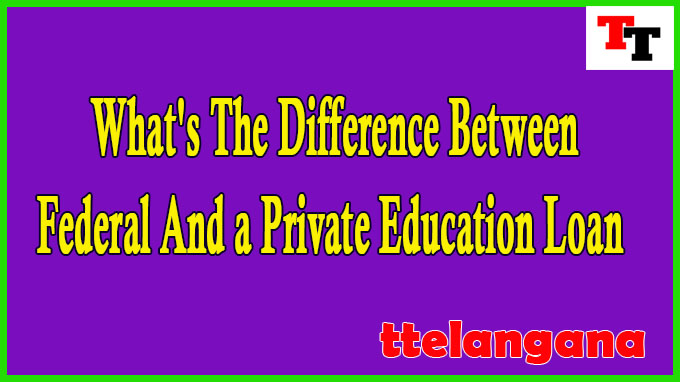What’s The Difference Between a Federal And a Private Education Loan
Federal and Private Education Loan Comparison
Education loans are a important resource for many students pursuing better schooling. Two number one classes of education loans are federal and private loans. While each serve the purpose of helping students cover their instructional charges, they differ in numerous aspects. This contrast delves into the differences between federal and private education loans.
1. Source of Funding:
- Federal Loans: These loans are funded via the U.S. Authorities and are administered thru the Department of Education. They aim to offer financial assistance to college students who require resource to pursue their education.
- Private Loans: Private loans, alternatively, are provided by banks, credit unions, and different monetary establishments. They aren’t subsidized with the aid of the government and are difficulty to the phrases and conditions set by means of the lending group.
2. Eligibility:
- Federal Loans: Eligibility for federal loans is determined by elements consisting of financial need, enrollment reputation, and citizenship. Some federal loans do now not require a credit test, making them reachable to a wider variety of students.
- Private Loans: Private loans generally require a credit score check, and eligibility criteria vary amongst creditors. Students with precise credit or a co-signer are more likely to qualify for favorable phrases.
3. Interest Rates:
- Federal Loans: Interest charges for federal loans are fixed via the authorities and are generally lower than the ones of private loans. These costs can vary primarily based on the mortgage type and prevailing marketplace conditions.
- Private Loans: Private loans have variable hobby fees primarily based on the lender’s evaluation of the borrower’s creditworthiness. This can lead to higher hobby prices compared to federal loans, specially if the borrower has restricted credit history.
4. Loan Limits:
- Federal Loans: Federal loans have annual and aggregate borrowing limits, which range based totally on elements like dependency status and academic level. These limits intention to prevent excessive scholar debt.
- Private Loans: Private loans often have higher borrowing limits than federal loans, which can be both high quality and risky. While they offer extra flexibility in overlaying academic fees, they can also lead to huge debt if no longer managed carefully.
What’s The Difference Between a Federal And a Private Education Loan

5. Repayment Options:
- Federal Loans: Federal loans provide numerous compensation plans, such as profits-driven plans that adjust month-to-month payments based at the borrower’s income. They also offer options for deferment and forbearance throughout financial hassle.
- Private Loans: Private loans may additionally have fewer repayment options and are typically less bendy than federal loans. Repayment phrases are determined by means of the lender and might not be as accommodating all through times of economic pressure.
6. Loan Forgiveness and Discharge:
- Federal Loans: Some federal loans offer forgiveness applications for debtors who paintings in sure public carrier professions or meet specific standards. Additionally, federal loans can be discharged in instances of permanent disability or the closure of the borrower’s college.
- Private Loans: Private loans typically do now not offer loan forgiveness applications. Discharge options are constrained and range with the aid of lender.
7. Cosigner Requirements:
- Federal Loans: Federal loans do no longer require a cosigner or credit score take a look at in most cases.
- Private Loans: Many personal loans require a cosigner, in particular if the borrower has a limited credit history or profits. A cosigner shares the obligation for repaying the loan.
Conclusion:
federal and personal education loans range drastically in phrases of their investment source, eligibility standards, interest costs, loan limits, repayment alternatives, and forgiveness applications. Students ought to carefully remember their monetary state of affairs, future plans, and the phrases of the mortgages earlier than you make a decision. Federal loans frequently provide more flexible and borrower-pleasant options, even as private loans may be a viable opportunity for college kids with installed credit score and the potential to steady a cosigner.